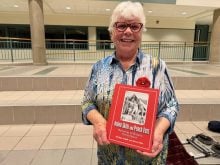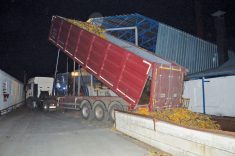Volodymyr Fedorchuk may have lost his farm business because of the war. But he hasn’t lost heart and he’s ready to start new projects.
I first met him years ago, at a Ukraine conference on the use of liquid fertilizers held by a well-known American company. It turned out that we were compatriots. His hometown is 40 kilometres from my house. Then I learned that Fedorchuk has a rare specialization. He is an agronomist who knows how to grow garlic and other vegetable crops.
During the last 10 years, Ukrainian farmers have almost completely switched to the cultivation of grain and oilseed crops. This is a relatively simple and profitable business that made it possible to grow a crop of wheat, corn or sunflowers, using proven technology, and sell it immediately.
Read Also

Should you teach your kids to hunt?
Teaching young people to hunt is an important rural tradition in Western Canada and teaches responsibility and love of nature, columnist Tim Sopuck writes.
Everything is much more complicated with vegetables. These crops require large investments, irrigation and specific knowledge. Seven years ago, Fedorchuk was invited to work in the south of Ukraine in the Kherson region. This region is a leader in growing vegetables because of its very fertile soil and warm climate. However, there is little rain here, so irrigation is a must.

For several years, Fedorchuk worked in a large company, where he grew garlic on an area of more than 100 hectares, as well as other vegetable crops. Over time, he realized that he wanted to create his own farming business. Together with his partner, he rented land on which he planted garlic, pumpkins and other crops.
It was going well until Feb. 24 of this year, when Russian forces invaded Ukraine, concentrating on the Kherson region.
“What can I tell you… This territory was occupied in the first days of the war. We sowed 40 hectares of land with elite winter garlic seeds and left everything. Now everything is overgrown with weeds,” he said.
Most of the Kherson region is now occupied by Russian troops, though in recent days the Ukrainian troops have begun taking back territory. People with a pro-Ukrainian position are tortured, imprisoned and killed there. The same fate could await Fedorchuk, but fortunately, at the time of the invasion, he was in central Ukraine in his hometown.

“My partner remained there, trying to save at least part of the business,” Fedorchuk said. “After all, the occupiers take everything they can from the farmers: crops, agricultural machinery, various equipment. We hid everything we could and hope that when this region is liberated by Ukrainian troops, we will be able to use it again.”
According to Fedorchuk, almost all small farmers in the occupied territories have stopped cultivating their fields. The invaders either take their property or impose a real tribute. Therefore, farmers only hire a tractor with a cultivator once every few months to destroy weeds in the field.
“You have to give a part of your harvest, as much as the robber with the machine gun will tell you,” he said. “There are no guarantees that everything will not be taken away from you. At the same time, collaborators from big business appeared who are making money on our trouble. They force small farmers to sell grain for 3,000 hryvnias, and then they themselves sell it for 15,000.”

Fedorchuk regularly calls his acquaintances who are under occupation in the Kherson region. He says that even those who previously had a favourable attitude toward Russia now see the real face of the occupiers.
“A significant part of the inhabitants of the region earned money by harvesting various crops: berries, fruits, vegetables,” he said. “It’s all frozen and people don’t have jobs. At the same time, prices for all products have increased several times.
“For comparison, the cheapest bag of tea, which costs 15-20 hryvnias in Ukraine, can be bought there for at least 100 hryvnias. At the same time, there is no natural gas in the houses and the light often goes out. Therefore, people cut down all the trees that grow around. The winter will be very difficult for them.”
Although Fedorchuk and his family managed to avoid occupation and shelling due to a lucky coincidence, he still has to solve a number of problems.
“My business partner and I invested a lot of money in growing garlic – at least $250,000,” he said. “Part of these funds had to be borrowed and must be returned, despite the fact that the business no longer exists. So far, the bank treats my debt loyally, but it reminds me more and more often that the money needs to be returned. And now I’m trying to earn money to pay off the loan.”
Fedorchuk has returned to his native town, where he got a job as an agronomist in a large agricultural company. He gives all the money he earns to the bank to repay his loan.
“Unfortunately, such problematic situations occur in life,” he said. “I did not believe until the last that there would be a big war. We thought about business development and were happy that we managed to create an effective technology for growing garlic. The yield of garlic in our fields was from eight to 12 tons a hectare. But you yourself see what happened. The bank understands everything, but the loan will still have to be repaid.”

During the seven months of large-scale war, loans have turned into a huge problem for many. Imagine that you borrowed $50,000 from the bank for a new apartment, and a rocket hit the house, completely destroying it. And at the same time, you lost your job, as happened to millions of Ukrainians.
Should you repay the bank? Obviously so. But who will be responsible for the fact that your home or business is destroyed and you have lost your livelihood?
Fedorchuk, like a true Ukrainian, does not lose heart and builds a new life. He returned to his native home and immediately turned it into a fortress.
“We have prepared firewood for the winter. I created a simple irrigation system and grew two tons of wheat, corn, potatoes and vegetables on half of acre of land. My wife raised 50 ducks. That is, we will have something to eat in winter and warmth in the house. I don’t want to complain about anything, because in Ukraine nowadays life is much worse for many people, especially those who lost their homes,” he said.
Fedorchuk also shelters nine refugees from the occupied regions who live for free on the second floor of his house. Many farmers in Ukraine are doing the same, trying to help their compatriots who lost their homes due to the Russian attack.
“We will do everything not just to survive, but to defeat and expel the enemy from Ukraine. It is impossible to conquer us,” Fedorchuk said.
He is looking for opportunities to start a garlic business again. After all, he has unique knowledge and experience in growing this highly profitable crop. The price of garlic in Ukraine is steadily increasing, but not all farmers have effective technology for growing it.
“If any Canadian farmers are interested in the garlic business, I am ready to help and co-operate. We will definitely win the war, and then Ukraine’s economy will begin to grow rapidly. We managed to create a unique technology for growing garlic, and I want to implement new projects in the future,” Fedorchuk said.
















